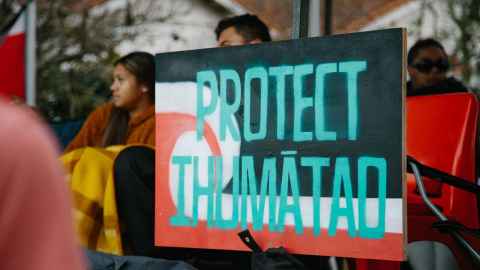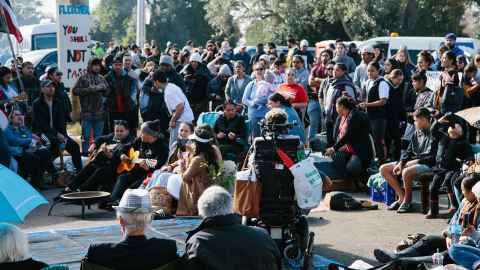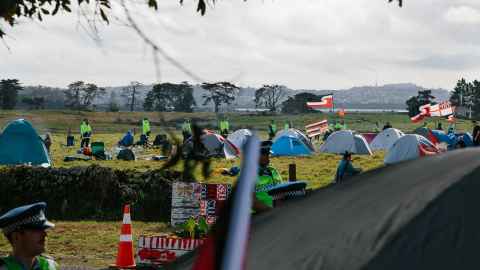Ihumātao and just relationships
29 November 2021
Opinion: A new study, involving some of those who saved the land at Ihumātao, aims to change the way indigenous rights progress in constitutional relationships.

Not so long ago, many New Zealanders had no idea Ihumātao existed, despite the fact it is home to Auckland International Airport. They knew nothing of its significance as the landing place centuries ago of the revered tupuna Hape, who arrived on the back of Kaiwhare (a stingray) from Hawaiki, ahead of the Tainui Waka.
Nor were they aware of its status as an exceptional cultural heritage landscape, or as a site of successive Crown breaches of Te Tiriti o Waitangi that wrought intergenerational trauma and displacement. The legacy of ahi kā kaitiakitanga and of resistance was also shrouded.
But the high-profile campaign #ProtectIhumātao, founded by six cousins from Makaurau Marae at the heart of the papākainga, increased public awareness. Strategic action led by ahi kā (the ones who keep the home fires burning), permanently etched its peaceful, passive, positive Indigenous-led resistance movement into our national imagination.
What happened at Ihumātao, and why it matters in the development of just constitutional relationships, is the subject of an innovative, hapū-led research project awarded $838,000 by the Marsden Fund. The project, Matike Mai Te Hiaroa: #ProtectIhumātao, is supported by Makaurau Marae and the hapū of Te Ahiwaru who are ahi kā at Ihumātao.
The title of the project relates to the long history and cultural narratives of Ihumātao and Waikato, for whom Hiaroa is a greatly admired ancestor and the sister of well-known Tainui voyager Rakataura. It represents the Indigenous struggle for the return of confiscated whenua. It also evokes Māori-led action for constitutional transformation – known as Matike Mai – calling for new ways to resolve Tiriti injustice and address Māori interests.

Justice and mutual respect are at the heart of the relationship between Māori and the Crown that was envisaged in 1840 for Aotearoa New Zealand by Te Tiriti o Waitangi.
But how do we give effect to just relationships against the background of colonisation and continuing injustice? The struggle for justice at Ihumātao encapsulates the struggle to establish just relationships in this context.
The preamble to Te Tiriti explicitly noted that the Crown was anxious to protect the ‘just rights’ of Māori. Yet, in the years since 1840, that relationship has been primarily characterised by injustice – from the 19th century land confiscations (including Ihumātao) to the inequities in our health system that have recently been highlighted and perpetuated by the government’s response to Covid-19.
Tensions at Ihumātao encompass unresolved Crown breaches of Te Tiriti o Waitangi, the limitations of Treaty Settlement Policy (in particular, that it excludes privately-owned land), inequitable heritage protection, and Indigenous-led political action.
Our project’s hapū-led approach means that marae whānau who led the active protection of the whenua will now play a central role in identifying methods of resolution that maintain the mana of ahi kā.
Campaign co-founders Pania Newton, Qiane Matata Sipu and Moana Waa are associate investigators, joined by the authors as primary investigators, and backed by Professors Linda Tuhiwai Smith (Te Whare Wānanga o Awanuiārangi) and Tim McCreanor (Massey), archaeologist Dave Veart and a Makaurau Marae representative as an advisory group.
Much is at stake. Ihumātao raises profound questions about who we are as a nation, what we value, and the constitutional frameworks, relationships and collaborations needed to support Māori aspirations for mana motuhake (political self-determination), within and beyond existing Tiriti arrangements. In the spirit of Matike Mai, the study will help to reimagine just constitutional relationships at a macro-level as well as in face-to-face Crown-Māori relations.

The international relevance of this case is searingly obvious, particularly in light of the UN Declaration of the Rights of Indigenous Peoples to which our country is a full signatory. Indigenous peoples around the world face similar experiences of government-or-corporate-driven land greed, usurped political authority, and cultural and environmental destruction, contributing to their diminished health and wellbeing.
Ihumātao sheds light on such problems. It confronts the urgent need to strengthen our own and international efforts to centre Indigenous interests in constitutional, treaty and human rights instruments. It also challenges legal and policy frameworks that fail to protect such interests, which may explain why Indigenous Peoples in other places are closely watching this case.
A heritage planning expert for the #ProtectIhumātao campaign Nicola Short joins the research team as a doctoral student.
“Less than 20 percent of our national heritage protection list is Māori heritage (either as tangible values embedded in whenua (such as middens) or as intangible values (such as cultural practices),” she says.

“Focusing on heritage at a landscape scale in this project will allow for greater recognition of Indigenous rights and values. It will also encourage critical engagement with heritage as a broad social, economic, political, cultural and environmental practice.”
In tertiary and high schools, and in public resources such as New Zealand’s Community Law Manual, Ihumātao is used as a case study to help understanding of interwoven issues raised in the #ProtectIhumātao campaign.
This new Marsden study will create an accessible archive of campaign resources for researchers, educators, students and others who are interested in these events. Critical understanding of these issues, and the actions taken, will help to inform law and policy change in Tiriti settlements, Crown-Māori relations, and equitable heritage protection.
We hope this research will support justice at Ihumātao, as its future is yet to be decided, and, in doing so, contribute to developing just constitutional relationships here, and between governments and Indigenous peoples globally.
Pūkenga Matua Carwyn Jones from Te Wānanga o Raukawa, Professor Jenny Lee-Morgan from Te Whare Wānanga o Wairaka UNITEC and Dr Frances Hancock, honorary academic in Te Puna Wānanga, School of Māori and Indigenous Education, Faculty of Education and Social Work. All are co-principal investigators on the study.
This article reflects the opinion of the author and not necessarily the views of the University of Auckland.
Used with permission from Newsroom Matike Mai Te Hiaroa: Ihumātao and just relationships 29 November 2021.
Media queries
Alison Sims | Media adviser
DDI 09 923 4953
Mob 021 249 0089
Email alison.sims@auckland.ac.nz